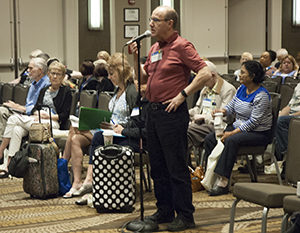
Attendees at the Public Advisory Roundtable ask questions during a breakout session.
Patients should not be the passive victims of their diseases and conditions. Instead, they should act as the quarterbacks of their treatment teams to improve their outcomes. That was the message delivered by six health care professionals to dozens of patients and their families at Saturday’s Public Advisory Roundtable (PAR) Meet-the-Experts session.
The experts at The Role of Patients in Advancing Treatments and Cures explained the role of research, how clinical trials are developed, and how patients can—and should—be more involved. That involvement is a two-way street, says Kathleen Lindell, PhD, RN, a research assistant professor at the University of Pittsburgh.
“Providers need to suggest patient involvement, but you need to ask them,” she says, adding, “It’s OK to ask questions.”
Patients in the audience, their families, and their friends were receptive to the message. Many already are proactive in their treatments, which is why they attended the PAR event.
Jennifer Miner, Chantilly, Virginia, has two teenaged sons with cystic fibrosis and asthma. Her oldest son has participated in clinical trials.
“I want to learn what other clinical trials are out there, and what else can be done from a patient advocacy perspective,” she says. “I’m just trying to figure out how best to treat them…what else could be done to help keep them healthy.
“My older son was diagnosed at 18 months, and we had an amniocentesis for my younger son, so we knew before he was born. That made a huge difference because that 18 months did so much damage to my 15-year-old’s lungs, but his brother has only been hospitalized for it one time.”
Another attendee, Carol Harrison, New York, has been diagnosed with sarcoidosis of the kidney in the last year. “I drove here because I am just reaching out for more information about the disease. This is a start to networking and finding out more,” she says.
